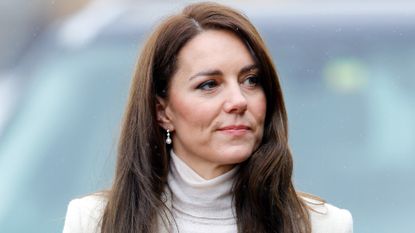
Princess Kate’s Cancer Diagnosis Fuels Online Conspiracy Theories, Experts Warn
In an unexpected turn of events, the admission made by the Princess of Wales regarding her cancer diagnosis has triggered a surge in online conspiracy theories instead of putting an end to speculations. Experts argue that this response was predictable, considering the persistent nature of unfounded theories on the internet and the individuals who propagate them.
Since Kensington Palace released an official video addressing the princess’s diagnosis, there has been a noticeable increase in social media posts and websites employing the hashtag #kategate. This hashtag has been used to promote unsupported theories about the princess.
According to BrandMentions, a company monitoring the spread of hashtags and keywords online, there were 400 mentions of #kategate on major social media platforms on Sunday. This number surpassed the previous peak of 373 mentions recorded the preceding weekend. The hashtag is most prominent on X, followed by Instagram and TikTok.
One TikTok video, which has amassed over 200,000 views since its posting on Sunday, suggests that the princess’s video announcement could have been manipulated and hints at the use of “AI imagery.” The BBC has released a statement confirming that the announcement video was filmed by a crew from its BBC Studios unit.
Quassim Cassam, a philosophy professor at Warwick University specializing in conspiracy theories, explains that evidence contradicting such theories often fuels their persistence. He states that attempts to disprove these theories are treated as part of the conspiracy itself, contributing to their resilience.
Whitney Phillips, an assistant professor of digital platforms and ethics at the University of Oregon, points out that individuals who propagate these theories on social media may do so for entertainment purposes. She notes that the rampant speculation surrounding these theories can be seen as an intriguing mystery or a distraction for participants, with little consideration for the harm or distress caused to those implicated in the theories.
Logically, a British firm specializing in disinformation analysis, has observed a trend where “diehard” participants in outlandish speculation are now joined by individuals who engage in it solely for amusement. Joe Ondrak, a senior analyst at Logically, describes it as an opportunity for ordinary internet users to indulge in conspiracy theories.
An executive at X believes that mainstream media outlets should shoulder responsibility for circulating a “hurtful” narrative. Joe Benarroch, head of business operations at X, asserts that every news outlet should take responsibility, express regret, and offer apologies to Princess Kate and her family while granting them the privacy they deserve.
Guidelines published by Meta, the owner of Instagram, state that the company fact-checks viral content on its platforms and takes action to curb the spread of hoaxes and misinformation by directing users to authoritative information.
TikTok’s guidelines regarding conspiracy theories aim to reduce the reach of “unfounded” theories that claim certain events are orchestrated by covert or powerful groups. However, the platform does permit “inaccurate myths or misinformation” as long as they do not cause significant harm.
Professor Cassam adds that, over time, the prominence of conspiracy theories surrounding the Princess of Wales will likely fade as proponents of these theories move on to new narratives. He suggests that individuals with a “conspiracy mentality” tend to shift their focus to other conspiracy theories as they emerge.